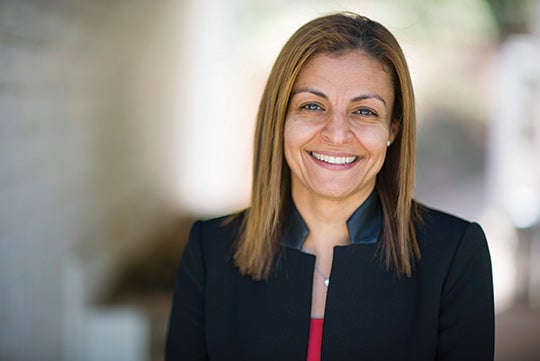Who’s Behind Wikipedia?
Maryana Iskander leads the global nonprofit Wikimedia and its volunteer-led platform with a mission to make knowledge free and factual.

When looking for quick, reliable information, we often turn to Wikipedia. It’s a resource that many people take for granted. Maryana Iskander ’97, the nonprofit’s CEO, is not one of those people.
One of the top 10 websites in the world, Wikipedia is distinctive in that it is hosted and supported by a nonprofit — the Wikimedia Foundation. This past January, Iskander joined the foundation as its new leader and is now championing the organization’s goal to make knowledge freely accessible.
For Iskander, it’s simple: By increasing access to free, reliable information, people are empowered to decide for themselves. “My goal is to remove barriers so that people can decide what they want and make their own choices.”
The Wikimedia Foundation supports a movement of hundreds of thousands of volunteer contributors who are working to preserve information and fill in knowledge gaps. There are groups devoted to adding women’s biographies, groups focused on racial equity and racial justice, and others who focus on historic documents and how those get added to the repository of free knowledge. At the end of the day, Wikipedia is an online encyclopedia.
“It’s not a social media platform. It’s not focused on what you think and what I think. It’s about a way of sharing credible, accurate, verified information that can be cited with reliable sources,” says Iskander.
Improving access to opportunity as a means of self-empowerment has been a theme of Iskander’s career and leadership roles, whether as COO of the Planned Parenthood Federation of America, where she advocated for access to health care, or as CEO of the Harambee Youth Employment Accelerator in South Africa, where the focus was economic opportunity.
A free society, an open society, gives more people access to opportunity and autonomy and dignity — all the things that I hope we wish for, not just for ourselves, but for our families, for the next generation and for everybody.
Rice has been a significant thread in this journey, she says, fondly recalling beloved professor Chandler Davidson (1936–2021), a sociologist who was instrumental in her understanding of the issues in society that matter. “I had learned, from my time as an undergrad at Rice, that being able to think and communicate effectively were two of the most important skills,” she adds. After Rice, Iskander studied comparative social policy as a Rhodes Scholar at Oxford. Along the way, she also earned a J.D. from Yale.
It is important to Iskander that information is not only available but accessible. Between 2017 and 2020, Wikipedia was blocked in Turkey; and this past June, Wikimedia was fined by the Russian government for not removing content related to the invasion of Ukraine. Wikimedia has appealed the decision.
“A free society, an open society, gives more people access to opportunity and autonomy and dignity — all the things that I hope we wish for, not just for ourselves, but for our families, for the next generation and for everybody,” Iskander says.
“Anyone can be a part of the effort to increase global access to free knowledge. This idea that we can all contribute to knowledge — not just consume knowledge — I think is really exciting and a way to invite others to join us.”
— Anya Bolshakov ’15
